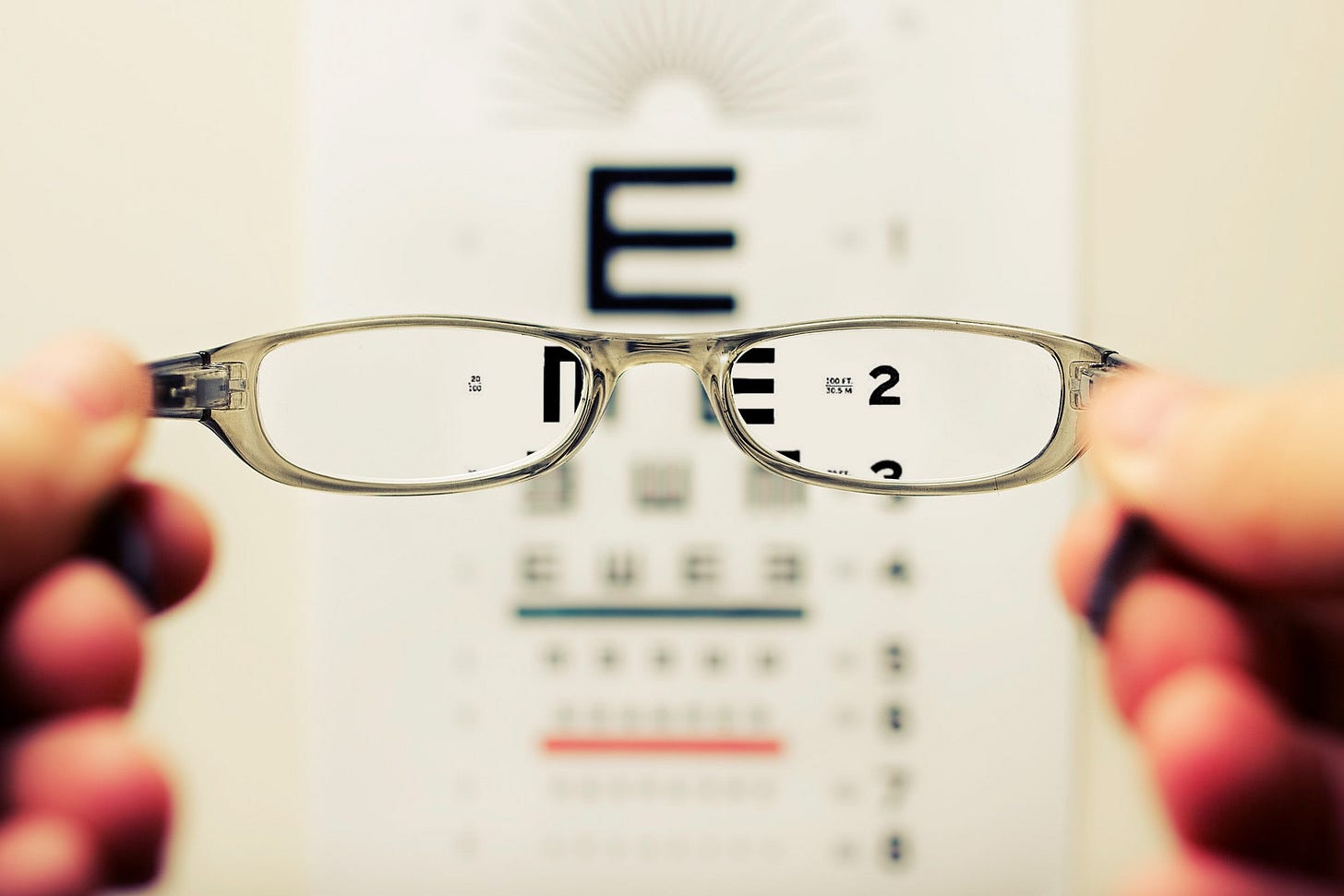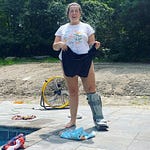
Until last week, I had never heard the N-word uttered out loud. Sure, there it is in music; in racist graffiti; in stories of racial abuse hurled at footballers from the stands. But I’d never had someone just… say it, like it was just another word, like it meant nothing more than any other word, like saying “toothbrush” or “profit margin” or “dog-whistle”.
Life is full of surprises.
I had laser eye surgery over a decade ago, in a plush established in Dublin 4. The waiting room was furnished in expensive couches. The walls were decorated with quotes from Irish B-listers about how great their experiences at said surgery had been, how much better their lives were now that they didn’t have to wear glasses, surely the ultimate faux pas in an industry where getting photographed (the flash!) is your bread and butter.
My eyesight wasn’t terrible to begin with, but I was doing a feature on a new technique available at that surgery, and they had offered to give my laser eye treatment in return, a kind of media quid pro quo that is frowned upon but very, very common.
The surgery itself was a breeze. It allowed me to imagine I was fulfilling my ultimate life goal – going through the Stargate – as I lay on my back, my eye propped open, dozens of stars flashing and flying past in the 20 or so seconds it took to correct my eyesight, one eye at a time. The following morning, I woke up with 20/20 vision and got rid of my glasses for good, or so I thought.
Smash cut to today, 2022, and, in the intervening years, my eyesight has started to deteriorate. Watching The Girl from Plainville, I realised that I couldn’t read a single one of the text exchanges being flashed on screen; when we watched Moon Knight, I was acutely aware of just how dark the whole thing was, how blurry I found the action scnes.
It was only when I was driving, one night a few weeks back, and found that I was seeing illuminated blurs when I should have been seeing oncoming cars that I thought to myself, I should probably get this checked out.
So it was that I found myself in the optometrist’s office last week, reading letters off a teeny tiny board, answering questions about which lens makes things clearer. “Er… maybe a little bit?” I would respond, forever afraid that I was lying to the optometrist. “Can I see the first one again?”
He was older, maybe in his late fifties or early sixties. A glasses-wearer himself, he had an easy smile and a twinkle in his eyes. “Irish?” he asked, after my initial greeting. “Yes,” I said, “Good guess!” (Americans, I’ve learned, love enthusiasm.)
“Your accent isn’t that strong!” he remarked, and we got chatting about what brought me here (my sister); what’s keeping me here (my sister, but also: my husband, my baby); why he ended up in Fort Wayne; what he likes about it.
“It’s a great place to raise a family,” he told me. “And I’ve never been a big city guy… I’m sure, to a New Yorker, the idea of living here would be just awful!” I’m sure it would.
We got to talking about the size of Ireland: “You can fit four Irelands into Texas!” I told him, although it’s actually closer to six.
“And I’m sure any Texan would tell you all about it!” he said, laughing.
I responded with a Texas-related anecdote which I instantly regretted. As the words fell from my lips I thought, nonononononono. But it was too late.
“I listened to a podcast based in a town in Texas,” said I, a fool. “It was called Southlake, about what happened in a school district when they tried to bring in education on critical race theory.”
Saying “critical race theory” to a conservative is a bit like shouting “fire” in a crowded theatre. It’s irresponsible and causes immediate pandemonium.
He began to talk to me, then, about politics in America. “It wasn’t always like this,” he said (quite reasonably, I thought). “It wasn’t always so divided. And you know what I think it was? Cable news. The cable news channels arrived and they were like propaganda. Before that, you just had news, and you could kind of trust what it was saying – now you have Fox, and it’s saying one thing, and MSNBC, and it’s saying another. And you ask someone who watches Fox, ‘Do you ever watch MSNBC?’ And they’ll tell you no, no way! And you ask someone who watches MSNBC if they ever watch Fox – they’ll look at you like you’ve two heads!”
This seemed sensible, and correct. I’ve never watched cable news, but I’m aware of its existence. I’m a leftie, not to mention a blow-in, so I read the New York Times and the Guardian and The Irish Times, occasionally, and I listen to their podcasts and I think, Fox News sounds awful, but I’ve never switched it on.
“The problem with the left,” he then said, and my eyesight blurred a little more. Uh-oh, I thought. Uh-oh.
“The problem with the left is that they want to censor people! And I do not believe in censorship. Like that quote, I may not agree with what you say, but I will defend to the death your right to say it,” he said.
I mumbled something entirely incoherent and, not for the first time in my life, thought, I am a coward.
The thing is – and this is not the first time, since moving to Fort Wayne, that I have faced this kind of conundrum – he seemed like a genuinely nice man. Like I said, a nice smile. Sparkly eyes. He had mentioned his kids – one of whom worked with him – and grandkids. He talked about not liking how busy big cities are, how little time people have for one another. Fort Wayne is nice, he’d told me, because before long you’ll always know someone who knows someone.
“That’s very like Ireland,” I’d told him and, not for the first time, felt comforted by that similarity.
I have no interest in arguing about politics, or censorship, or libertarianism – he considers himself a libertarian, he told me, but of course – with someone whose mind will not, and can not, be changed. He did not strike me as someone who was open to learning about new ideas, at least not from this Irish woman he’d never met before, who surely could not possibly understand the complexities of American politics.
So I said nothing.
I said nothing as he told me about how extremists on the left wanted to “cancel” people for their political views. I said nothing as he laughed at the notion that “people on the left” pretend to be all for free speech but then want to stage a protest when Elon Musk buys Twitter.
And I said nothing when he said, “You know, the most controversial word in America right now is the word [and here he said the N-word; I don’t want to write it down]. You want to say that word on a street corner in Chicago? Go right on ahead!” he said. “You are fully entitled to do that. You’ll get beaten six ways to Sunday, but you are still free to say it.”
I said nothing because there is nothing I could have said that would have made him change his mind. I could not, in the time we had together, have convinced him that the world would be a better place if no white person used that word; that critical race theory is actually a good thing; that “people on the left” don’t want to silence anyone, but they want to make people try to be kinder, more considerate, more thoughtful in their reactions to and descriptions of others.
What I could have said is, “I would rather you didn’t use that word in front of me, even to illustrate a point”. I could have said, “you and I both know that there is good reason not to use that word, both on a street corner and in your optometry practice”. I could have said, “You seem like a very nice man, but I am not comfortable giving you my business.”
Like I said, a coward. My glasses will be ready next week.
I won’t go back to that optometrist, but as far as principled stands go, it’s not a great one. I doubt he’ll remember me, or wonder why I didn’t come back, or ever put two and two together and see anything wrong with that conversation we had last week in that little room. I could be wrong (but I doubt it).
Southlake is brilliant, by the way. I don’t think I’ll ever get close to fully understanding America – what formed its politics and how it got to where it is now – but every time I consume a piece of news media like Southlake, I feel as though I get a little closer.
I didn’t recognise Chloe Sevigny in The Girl from Plainville, and I guess, for an actor, that’s a compliment. Sevigny is so recognisable to me as the defining It-girl of an era that I was shocked when I copped, three episodes in, that she was playing the role of grieving mother in this based-on-a-true-story drama. It’s good, too, but I can only watch it in chunks, with a chaser in between.
Last week I read two books! Ali Hazelwood’s The Love Hypothesis and Bethany Rutter’s Welcome to Your Life (currently available on Kindle for 99p). I loved them both, even if the sexy bits made me criiiiiinge. I would like them both to be made into rom-coms toot suite; I feel as though, post Panny-D, we could all do with a good rom-com or seven.
















Share this post